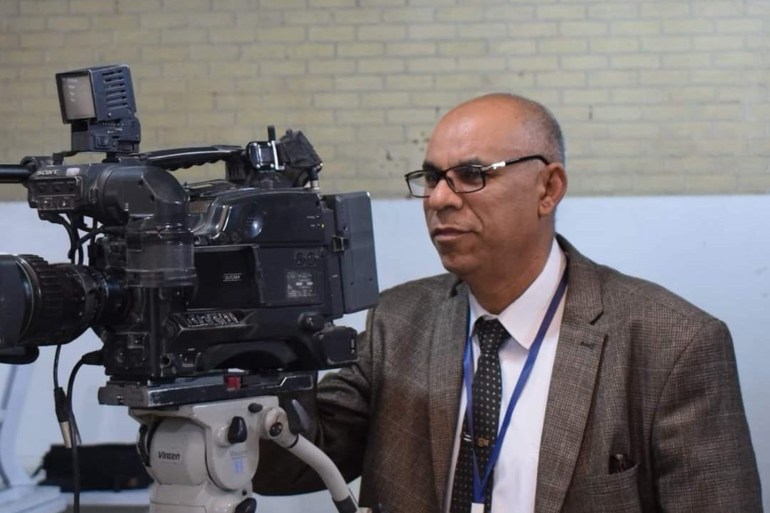The Iraqi actress Ghazwa Al-Khalidi is considered one of the most prominent pioneers of the Iraqi theater.
Al-Khalidi was born on January 19, 1943, and began her artistic activity in the 1960s, but she was later forced to leave Iraq because of her opposition to the regime of late President Saddam Hussein, as she was threatened with death more than once.
Hani: Al-Khalidi's first appearance on stage was in 1965 (Al-Jazeera)
Her artistic beginnings
Director Taqi Hani says that Al-Khalidi’s first appearance on the stage was in 1965 when she was a student at the Institute of Fine Arts, in a theatrical work called “The Flood” by Professor Hamid Muhammad Jawad;
The character that influenced her greatly.
Hani adds to Al Jazeera Net that Al-Khalidi participated in her artistic beginnings in the play "Hamlet", as well as the play "The Sun Rises from There" directed by Dr. Abdul Muttalib Al-Sunaid, noting that she worked on the radio in 1972.
And about the reason for calling it, Hani mentions that the name of the Battle of Al-Khalidi was given to her by her mother while she was reading a book about the Battle of Badr, and some friends used to call her the Battle of Badr.
And about the beginnings of her entry into the world of art, the artist Al-Khalidi says that "the artist Abdul Mursal Al-Zaidi is credited with entering the world of acting," and she adds - in a press interview - that "when I participated in the representation of the play The Flood, I presented an important figure and everyone recognized me as an actress, and I have not yet recognized myself. I'm an actress."
Al-Khalidi believes that the artistic community in the sixties was much more beautiful than today, and "the relationships and friendships in the artistic community were beautiful and pure, and the material was not important in the artist's life, as he was acting because he loves acting."
And she added, "Art is still fine, but I hope that the level of the sixties theater will return, and the theater audiences from Iraqi society will return to the passion for follow-up."
Leading Artist
The artist and director, Tafat Aziz, says that Al-Khalidi is one of the leading Iraqi artists in theatrical, film, television and radio genres, noting that she is a graduate of the Institute of Fine Arts since the days of the great artist Haqqi Al-Shibli.
Aziz adds to Al Jazeera Net that Al-Khalidi is an accomplished writer, and she has written many writings for television work, and she has also worked in various artistic fields;
She is a radio director and theater actress, as well as presenting programs on local television channels.
Aziz confirms that Ghazwa Al-Khalidi is a well-versed artist, whether in theater and television acting, radio directing or writing, pointing out that one of her most prominent works was a first assistant director in the series "War of Al-Basous" with director Emmanuel Rassam.
As for the joint artworks with Al-Khalidi, Aziz found out that she worked with her in the play "A Baghdadi Night with Mullah Aboud Al-Karkhi" in 1982, which was directed by the late Sami Abdel Hamid, and represented by Youssef Al-Ani, Muhammad Hussein Abdel-Rahim and Ghazwa Al-Khalidi, with students from the Academy.
Shubra: Al-Khalidi did not stop in exile from writing texts that try to address the concerns of the Iraqi community (Al-Jazeera)
art and politics
In turn, the playwright Hisham Shubar confirms that the artist Ghazwa Al-Khalidi is one of the pioneers of the Iraqi theater, and has presented many successful theatrical works.
Shuber talks to Al Jazeera Net about her most prominent theatrical works, including the play "The Flood", "Hamlet" and "The Sun Rises from There", and says that she presented a group of tragic and comedic works, indicating that one of her comedic works is the play "Umm Khalil" with the actor Jassem Sharaf, and Art The operetta with the artist Fouad Salem. The artist also worked in various artistic fields and wrote a series of dramatic works.
The playwright asserts that despite Al-Khalidi's long hiatus from artistic activity due to alienation, she is still searching for a dramatic work worthy of her level.
He points out that despite the difficulty of alienation, she has not stopped writing texts, most of which focus on addressing the alienation of the Iraqi community and its concerns.
Shuber reveals that the artist Al-Khalidi was subjected to death threats more than once because of her opposition to Saddam Hussein's regime before 2003, and that this called her to leave Iraq.
Hamid described Al-Khalidi as a comprehensive and exceptional Iraqi artist in modern Iraqi women's artistic history (Al-Jazeera)
in exile
Writer and critic Ahmed Hamid describes Al-Khalidi as a comprehensive and exceptional Iraqi artist in modern Iraqi women's artistic history, who is on the cusp of her 80s and immigrated from Iraq about 40 years ago to the United States.
He adds to Al Jazeera Net that Al-Khalidi is the daughter of her cultural generation, and therefore this artistic comprehensiveness that she enjoys was the result of a high-level cultural climate that Iraq witnessed in the sixties and seventies.
He notes that Al-Khalidi was an opponent of the former Iraqi regime, and she worked at the time for Radio Free Iraq, as well as with the Iraqi Alsumaria TV and Radio Sawa, while she travels between Amman and America.
Hamid believes that after her absence, no one filled her place in the women's artistic scene, despite the presence of capable Iraqi female artists within the artistic community, but this artistic comprehensiveness was specific to Al-Khalidi's invasion and nothing else.

